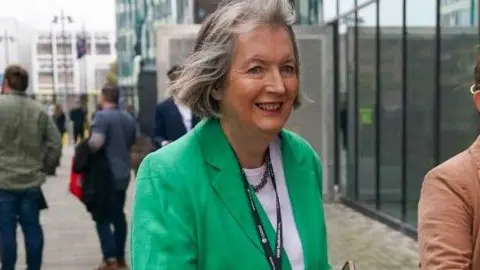
 Shutterstock
Shutterstock
Former deputy Labour leader Baroness Harriet Harman has said “missteps” and “clunkiness” should be expected when a new administration arrives in Downing Street.
She was speaking to the BBC after Sue Gray quit her role as Prime Minister Sir Keir Starmer’s chief of staff, amid intense criticism and controversy.
Defence Secretary John Healey said she had played a “massive role” in preparing the party for power, but had “become a distraction”.
Ms Gray had been caught up in rows over pay after the BBC’s political editor revealed her salary was higher than Sir Keir’s and over donations from Lord Waheed Alli.
Speaking on BBC Radio 4’s The Westminster Hour, Baroness Harman praised her “completely honest, hard working” character.
“I always found her excellent to work with,” she told the programme.
Addressing Labour’s turbulent first three months in office, which have been dogged by rows over freebies, Baroness Harman said: “It’s often the case if you have been out of power for a long time and you get in, there are missteps, there is clunkiness.”
MPs were returning to Westminster on Monday, after a three week recess for party conferences.
Speaking to BBC Breakfast on Monday, Healey said: “She made a massive contribution to helping prepare Labour for government, we owe her a great deal, but as she said herself yesterday, she’d become a distraction with the commentary that was removing the focus on the government’s job of working for change, and that’s why she’s stepped aside.
“I’m really glad she’s going to carry on working with the government, working with the prime minister.”
Announcing her resignation on Sunday, Ms Gray said the “intense commentary” around her position meant she “risked becoming a distraction” to government proceedings.
She had been caught up in rows over pay, and embroiled in controversy over clothing donations from Lord Alli, for whom she had reportedly authorised a temporary Downing Street pass.
The BBC’s Political Editor, Chris Mason, was told by reliable sources that a decision had been made on Friday and the prime minister had been willing to sack Sue Gray. Sir Keir had decided, whatever she said, that she could no longer be his chief of staff.
Ms Gray, who became a household name as the Partygate investigator, is taking up a newly created part-time job as the prime minister’s envoy for nations and regions, in what our political editor says is a massive demotion.
The prime minster replaced her with Morgan McSweeney and has made four new appointments, including hiring James Lyons as a strategic communications lead.
Ms Gray had been subject to lengthy internal briefings and criticism in a government yet to reach its first 100 days in office.
The prime minister will be wanting to “get things sorted out, batten down the hatches and get things moving forward,” Baroness Harman said.
While leader of the House of Commons, she worked closely with Ms Gray when she was senior civil servant.
She had also defended Ms Gray’s pay after our political editor revealed her salary was higher than Sir Keir Starmer’s, insisting it was “the rate for the job”.
Just a few weeks ago, Deputy Prime Minister Angela Rayner defended Ms Gray’s “exceptional” work and said she was being “demonised” in the media without the ability to answer back, with other ministers expressing discomfort at the “gendered” flavour of the attacks.
A spokesperson for the Conservative opposition said: “In fewer than 100 days Sir Keir Starmer’s Labour government has been thrown into chaos, he has lost his chief of staff who has been at the centre of the scandal the Labour Party has been engulfed by.”

 Getty Images
Getty Images
Conservative leadership hopeful Robert Jenrick said the government was in “free fall” while fellow candidate James Cleverly said Labour’s “first 100 days” had been a “disaster” and “their civil war continues with the loss of Sue Gray”.
Lord Gavin Barwell, who worked with Ms Gray in his role as chief of staff to former Prime Minister Baroness Theresa May, told Radio 4’s The World this Weekend that she had “made the right judgment” to stand down from her role.
“On a personal level I’ve worked closely with Sue… and she is an incredibly dedicated public servant and I feel for her, but I think she’s made the right judgment, which is when you’re in this kind of job once you become the story it becomes very hard to do the job,” he said.


Sign up for our Politics Essential newsletter to read top political analysis, gain insight from across the UK and stay up to speed with the big moments. It’ll be delivered straight to your inbox every weekday.








